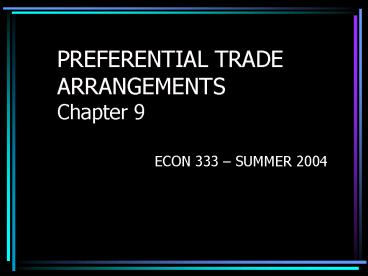PREFERENTIAL TRADE ARRANGEMENTS Chapter 9 - PowerPoint PPT Presentation
1 / 20
Title:
PREFERENTIAL TRADE ARRANGEMENTS Chapter 9
Description:
Preferential trading agreement (PTA): An agreement between ... Brunei Darussalam. Canada. Chile. People's Republic of China. Hong Kong, China. Indonesia ... – PowerPoint PPT presentation
Number of Views:154
Avg rating:3.0/5.0
Title: PREFERENTIAL TRADE ARRANGEMENTS Chapter 9
1
PREFERENTIAL TRADE ARRANGEMENTSChapter 9
- ECON 333 SUMMER 2004
2
Preferential Trading Agreements
- Preferential trading agreement (PTA) An
agreement between several countries to reduce
trade barriers against each other. - Forms of PTAs
- Free Trade Areas
- Customs Unions
- Common Markets
- Economic Unions
3
Levels of Integration
- Free Trade Area Zero tariff for members, but
independent external tariffs. - Customs Union Zero tariffs for members and
common external tariff. - Common Market Customs Union Free movement of
factors of production. - Economic Union Common Market Same economic
policies for member countries.
4
Levels of Economic Integration
Preferential trading
arrangement
Free-trade area
Customs union
Common market
Economic union
Common economic policies and common currency
Intra-group capital and labor mobility
Reduction of intra-group tariffs
Removal of intra-group tariffs
Common external tariff
5
Tariffs Under Different Stages of Integration
t 10
t 10
A
B
C
t 5
t 20
(a) Preferential Trade Arrangement
6
Tariffs Under Different Stages of Integration
t 10
t 0
A
B
C
t 0
t 20
(b) Free-trade Area
7
Tariffs Under Different Stages of Integration
CET 15
t 0
A
C
B
t 0
CET 15
(c) Customs Union
8
Trade Creation Trade Diversion
- Economic integration results in
- Trade creation Increased imports from the member
countries. - Trade diversion Imports switch from the
non-member to member countries. - Economic integration improves welfare if the
effects of trade creation outweighs that of trade
diversion. - Political reasons often play a role in the
formation of preferential trading arrangements. - EU.
9
Major Integration Attempts
- European Union (EU)
- North American Free Trade Agreement (NAFTA)
- Association of South East Asian Nations (ASEAN)
- Southern Common Market (MERCOSUR)
- New Attempts
- Free Trade Area of Americas
- Asia Pacific Economic Cooperation
10
ASEAN
11
MERCOSUR
12
EU
13
FTAA
14
APEC
15
Intra-Group Trade as Percent of Total Trade, 1996
70
Percent
60
Intra-Group Exports as Percent of Total Exports
Intra-Group Imports as Percent of Total Imports
50
40
30
20
10
0
EU
NAFTA
ASEAN
MERCOSUR
16
NAFTA
- Members Mexico, US and Canada.
- Took effect in 1994.
- Different levels of economic development among
members. - Immediate removal of tariffs on about half of
members trade. - Free trade in all goods and services by 2008.
17
U.S. Apparel Imports, 1993 and 1996
Percent
39
40
1993
35
1996
30
30
25
20
15
9.6
10
4.4
5
0
Mexico
Asia
18
European Union
- 1957 Treaty of Rome.
- Six-member European Community BeNeLux, France,
Germany, and Italy. - The main goal was political Unification of
Europe - To prevent another war
- To be an effective rival to the US
- It also aimed to form a common economic market.
19
European Union
- 1971 10-year plan to achieve full economic
union. - The Single Europe Act (1987)
- developing a single system of standards, and
- removing non-tariff barriers among EU member
countries. - The Maastricht Treaty (1991)
- An agreement to form a monetary and economic
union with a common currency - Establishment of the European Central Bank (ECB)
20
Institutions of the EU
- The European Commission
- Drafts and enforces EU laws
- The Council of the EU
- Issues directives to the member states
- The European Court of Justice
- Decides on the legality of regulations,
directives, and decisions - The European Parliament
- Legislative branch































